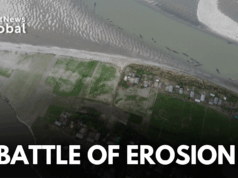A US coalition has killed 11 people and injured 14 others in strikes on small towns in eastern Yemen, according to a Reuters report. According to a statement by the US Central Command (CENTCOM), the strikes were in retaliation for Houthi missiles targeting a Singapore-owned ship.
“Between 8:50 a.m. and 12:50 p.m. (Sanaa time) on March 11, Iranian-backed Houthi terrorists fired two anti-ship ballistic missiles from Houthi-controlled areas into the Red Sea toward merchant vessel Pinocchio, a Singaporean-owned, Liberian-flagged ship. The missiles did not impact the vessel and there were no injuries or damage reported,” the CENTCOM stated.
The statement said six “self-defense strikes” were carried out to destroy an unmanned underwater vessel and 18 anti-ship missiles in Houthi-controlled areas of Yemen. It was determined these weapons threatened merchant vessels and U.S. Navy ships in the region.
“These actions are taken to protect freedom of navigation and make international waters safer and more secure for U.S. Navy and merchant vessels,” the statement added.
The strikes come after the Houthis had launched one of their largest attacks on US shipping in the Red Sea and the Gulf of Aden. According to the Guardian, the group had stated on March 9 that they had fired 37 drones against the US-led coalition, the latter claims the numbers were much less.
“Between 4 a.m. and 6:30 a.m. (Sanaa time), Iranian-backed Houthi terrorists conducted a large-scale uncrewed aerial vehicle (UAV) attack into the Red Sea and Gulf of Aden. CENTCOM and coalition forces identified the one-way attack (OWA) UAVs and determined that they presented an imminent threat to merchant vessels, U.S. Navy, and coalition ships in the region. U.S. Navy vessels and aircraft along with multiple coalition navy ships and aircraft shot down 15 OWA UAVs,” Centcom said on X.
The impact of the Houthi strikes can already be seen. According to an IMF report, “in the first two months of 2024, Suez Canal trade dropped by 50 percent from a year earlier while trade through the Panama Canal fell by 32 percent, disrupting supply chains and distorting key macroeconomic indicators.”
The Houthi attacks may be affecting port calls across the world. According to the report, “in January and February 2024, there was a 6.7 percent decline year-over-year in port calls to the 70 ports we track in sub-Saharan Africa. The corresponding declines for the European Union and the Middle East and Central Asia were 5.3 percent.”
The success of the Houthi attacks has raised some questions about Nato’s effectiveness and cohesion. Admiral Luigi Binelli-Mantelli, former chief of the Italian Navy, noted that “France and Italy won’t join the US-led coalition in the Red Sea. This will have no impact from an operational point of view, since navies are well trained to coordinate their actions even outside a definite chain of command, but politically it’s proof of our weak cohesion as NATO as well as EU partners.”
Captain Sarabjeet Singh Parmar, (Retd), Distinguished Fellow at the USI, New Delhi agrees. “My question is what happened to interoperability? If nations have been practicing together for so many years this is the testing ground. We have Nato allies not operating under Operation Prosperity Guardian but acting independently. This is serious because we are going back to the early 2000s, because we are seeing a resurgence of both piracy and the Houthis.”
Traveller, bibliophile and wordsmith with a yen for international relations. A journalist and budding author of short fiction, life is a daily struggle to uncover the latest breaking story while attempting to be Hemingway in the self-same time. Focussed especially on Europe and West Asia, discussing Brexit, the Iran crisis and all matters related is a passion that endures to this day. Believes firmly that life without the written word is a life best not lived. That’s me, Ashwin Ahmad.





